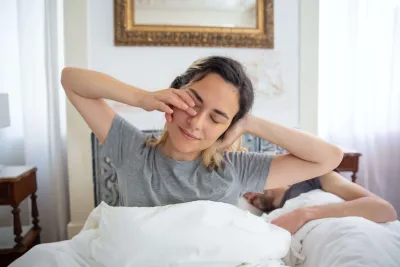
Key Takeaways
A realistic sleep resolution sets the foundation for better energy, focus, and health all year long.
- Setting a clear, achievable sleep goal helps turn good intentions into lasting habits that support daily performance.
- Keeping consistent sleep and wake times—even on weekends—is one of the most effective ways to improve sleep quality.
- Sleep trackers and smart sleep tools can help you spot patterns, measure progress, and stay accountable.
- Mindful habits like limiting late-day caffeine and reducing screen time before bed can lead to meaningful sleep improvements.
- Tracking progress, celebrating small wins, and adjusting your approach over time makes it easier to stick with your sleep resolution.
As the end of the year draws closer, we’re willing to bet that you’ll be pulling out your pen and paper to start writing down your latest batch of New Year’s resolutions. Properly preparing a New Year’s resolution can lead to making lasting changes putting you on the path to a more productive and healthier you.
When making those resolutions, it’s human nature to focus on what we consider failures over the last year; however, it’s always a good practice to evaluate what you were successful at in the previous year so you can build on those successes, too.
For many, resolutions are centered on diet, exercise, relationships, careers, and more. Of course, based on our sleep-first philosophy, it probably won’t surprise you that we suggest adding a new item to this list: sleep goals.
With so much focus on how sleep can aid in recovery and your overall health, striving to sleep better this year—or any year, for that matter—should be a priority.
Upgrade Your Sleep This Year!
Tired of setting big goals on tired nights? Meet the Chilipad Sleep System — your personal climate concierge for deeper, smarter sleep. Whether you run hot, cold, or somewhere in between, Chilipad fine-tunes your bed's temperature to keep you perfectly comfortable all night long.
Why Create a New Year’s Sleep Resolution?
A sleep resolution is a structured commitment to improving physical and mental health by optimizing sleep hygiene, consistency, and environment.
Making a sleep resolution is a great way to focus on well-being and healthier habits in the new year. Sleep is vital for bodily systems to function optimally. It enhances cognition and memory, strengthens physical health, and improves emotional well-being.
Sleep is essential to success. Achieving enough quality sleep creates energy to work out, increases work efficiency, encourages new ideas, and supports weight loss.
Research indicates that good rest boosts self-regulation, allowing one to remain committed to objectives. [1] Even forming steady sleep patterns can bolster self-control and aid in pursuing ambitions, especially when facing a challenge. [2] Additionally, getting quality sleep has been shown to help with additional New Year’s goals.
Common Mistakes to Avoid When Creating a Sleep Resolution
Many sleep resolutions fail because they are too vague, unrealistic, or hard to maintain. Avoid setting goals like “sleep better” without a clear plan, making drastic changes all at once, or expecting perfect consistency.
Skipping a wind-down routine or ignoring factors like caffeine, stress, and screen time can also undermine progress. Focus on small, specific changes and build habits gradually to create a sleep resolution you can stick with.
A Simple One Week Sleep Reset to Kick Off the Year
If big resolutions feel overwhelming, start with a one week reset. This approach focuses on small changes that stack quickly and are easier to keep.
- Day 1: Set a bedtime and wake time: Pick a realistic bedtime and wake time you can hold most days of the week. Consistency matters more than sleeping in.
- Day 2: Adjust bedroom temperature: Create a cooler sleep environment that helps your body power down. If you sleep hot, tools like the Chilipad help control temperature right at the mattress, where it matters most.
- Day 3: Cut late caffeine: Set a caffeine cutoff time in the early afternoon. This gives your nervous system time to settle before bed.
- Day 4: Create a wind down cue: Choose one simple signal that tells your brain it is time to slow down. Dim lights, read a book, do bedtime journaling, or a warm shower all work well.
- Day 5: Optimize bedding and sleep surface: Lightweight, breathable bedding helps reduce heat buildup and night disruptions. If sleeping hot is an issue, a temperature controlled mattress topper like the Chilipad can help by regulating heat directly at the mattress level, keeping your sleep environment more consistent throughout the night.
- Day 6: Review what worked: Notice what made falling asleep easier and what did not. Keep the changes that felt natural.
- Day 7: Lock it in: Carry the best habits forward into the next week. No resets needed, just repeat what works.
This reset is not about perfection. It is about setting up sleep so it works with you, not against you.
Understanding Sleep Fundamentals
Sleep is a fundamental aspect of human life, playing a critical role in physical and mental restoration. During sleep, the body repairs and regenerates tissues, builds muscle and bone, and strengthens the immune system. Sleep also helps to consolidate memories, process emotions, and regulate hormones.
Understanding the fundamentals of sleep is essential for maintaining good health and well-being. There are two main types of sleep: non-rapid eye movement (NREM) sleep and rapid eye movement (REM) sleep. Slow brain waves, low blood pressure, and a slow heart rate characterize NREM sleep.
REM sleep is important, marked by rapid brain waves, increased heart rate, and vivid dreams. A good night’s sleep typically consists of 3-5 cycles of NREM and REM sleep.
Related Blog: How to Get More REM Sleep
Sleep Goals & Resolutions to Explore
Below, we’ll focus on five sleep goals for you to consider for your new year’s planning and to continue in the upcoming year.
Identify Your Chronotype
Understanding your chronotype is an important first step in creating a sleep resolution that actually works. Your chronotype is influenced by your PER3 gene and helps determine your circadian rhythm—your internal clock that regulates sleep, wake times, eating patterns, and other daily activities.
While some sources break chronotypes into many categories, it’s often easiest to think in terms of two main types: early birds and night owls. Early birds naturally feel more alert in the morning and prefer earlier bedtimes, while night owls tend to feel more energized later in the day and struggle with early mornings. Many people fall somewhere in between.
Different chronotypes may also have different sleep needs. For example, a night owl may require more flexibility in bedtime or a slightly different sleep schedule than an early bird to feel fully rested. Recognizing your natural rhythm can help you set sleep goals that feel achievable instead of forced.
Once you understand your chronotype, you can tailor your sleep resolution—whether that means adjusting your bedtime, wake-up time, or evening routine—to work with your biology rather than against it.

How Often Should I Review My Sleep Goals?
It’s a good idea to review your sleep goals regularly, about once a week or every two weeks. This allows you to notice patterns, see what’s working, and make small adjustments before habits slip. Regular check-ins help keep your goals realistic and flexible, so your sleep routine can evolve with your schedule and needs.
Establish A Sleep Routine
Perhaps you already have a set sleep schedule; you hop in bed at 10 pm, sleep till 6 am, and you’re good to go. However, if you don’t have a sleep routine, creating one based on your chronotype will go a long way towards getting a good night’s sleep consistently.
Specifically, how to get more deep sleep is something we’re passionate about.
Interested in diving deeper into the subject of deep sleep and understanding its crucial role in your overall health. Learn more insights and information on deep sleep and understand its crucial role in your overall health.
Going to bed and waking within the same windows daily is one of the great secrets to getting quality sleep night in and night out.
Sometimes, your schedule doesn’t allow it, especially for shift workers, so do your best. But if you’re struggling to sleep and have been reluctant to create steady sleep habits, this goal should be your highest priority.
Create Habits Around Waking Up
Technically, this is an extension of goal #2, but this goes beyond timing and sleep windows. (But yes, waking up when your alarm goes off should be a habit.) What do you do first in the morning? It’s worth considering, especially if the first thing you do is grab your smartphone or turn on the TV.
Related Blog: Does Blue Light Keep You Awake?
Did You Know? 6 in 10 people hit the snooze button in the morning? Are you looking to end snoozing? Learn how to stop snoozing and wake up refreshed!
For example, getting sunlight in the morning has its benefits, especially considering most of us spend most of our lives indoors. But getting sunlight ensures you’re getting enough Vitamin D, which allows you to maintain appropriate serotonin levels and keep your circadian rhythm running like clockwork.
Getting outdoors in the morning is just one option here; the goal for the first 30 minutes you’re awake should be to create some “me time” that allows you to get a great start to your day (and you can create that 30-minute “me time” window before bed, too).
New Sleep Habits to Try: Meditation and Yoga Nidra.
We’ve discussed establishing new routines and creating 30-minute windows before bed and once you wake up. What can you add or subtract to or from your current routine to mix things up? There are a variety of options that have the potential to help you sleep better.
Trying new habits can lead to refreshing sleep, which is essential for overall health and well-being.
We’ve praised meditation concerning sleep, and its benefits around reducing stress and anxiety alone make it worthwhile. Yoga Nidra provides similar benefits as well. But if you’re not willing to leap into these specific practices, start small and build towards them.
Maybe you turn the TV off that 30 minutes before bed or leave your smartphone downstairs. Ultimately the goal is to try to integrate new habits that have the potential to improve your sleep.
Tip: Common sleep disorders can significantly impact sleep quality, so it's important to consult healthcare providers for diagnosis and treatment options.
"How to Conduct a Quarterly Sleep Inventory.
While you can start on the adobe sleep goals in January, wait a little longer on this one. But in a couple of months, after you’ve established a routine, created healthy habits, and tried new things, it’s time to take inventory and see what you would change and keep.
Why Your Sleep Environment Matters More Than Motivation
You can set the best sleep goals possible, but if your bedroom works against you, motivation will not carry you very far. Sleep is driven by biology, not willpower.
One of the biggest factors in sleep quality is bedroom temperature. Your body naturally cools down as you fall asleep. When your sleep space stays too warm, that process gets disrupted, leading to lighter sleep and more wake ups. This is why overheating is a common reason New Year’s sleep resolutions fall apart.
Fixing the environment is often easier than forcing new habits. When your bedroom supports your body’s cooling process, sleep becomes more consistent with far less effort.
For people who sleep hot, cooling mattress technology like the Chilipad can help manage sleep temperature directly at the mattress level. By circulating temperature controlled water through the bed topper, it keeps your sleep surface cool and stable all night, even if the room temperature changes.
When the environment works, sticking to better sleep habits stops feeling like a struggle.
Tips include:
- Use blackout curtains or shades to block out light
- Invest in a comfortable mattress and pillows
- Keep the room cool, with a temperature between 60-67°F (15-19°C)
- Use earplugs or a white noise machine to reduce noise
- Avoid screens and electronic devices before bedtime
- Use aromatherapy, such as lavender or vanilla, to promote relaxation
Final Thought
A New Year sleep resolution only works if it turns into action. Reading tips is a start, but real progress comes from testing one change at a time, paying attention to the results, and sticking with what actually helps you sleep better.
As you work through your resolution, watch for patterns. If falling asleep stays difficult, if you wake up often, or if you feel exhausted despite enough time in bed, it may be worth talking with a healthcare professional. Issues like insomnia or sleep apnea can block progress no matter how committed you are.
Sleep needs also shift over time. What worked last year may not work this year. Treat your New Year sleep resolution as a reset, not a finish line. Check in weekly, adjust as needed, and keep the habits that support better rest.
Set a clear goal. Fix the environment. Review what works. Carry it forward.
That is how a New Year sleep resolution turns into better sleep all year long.
Frequently asked questions
How do I make a sleep resolution?
A sleep resolution is a simple, realistic commitment to improve one part of your sleep. Start by choosing a specific New Year sleep goals;
- Assess your current sleep quality.
- Determine your chronotype.
- Set a 'Fixed-Anchor' wake time.
- Audit your sleep environment
Why Is Setting a Sleep-Related New Year’s Resolution Important?
Improving your sleep can enhance your health, mood, energy levels, and focus, helping you achieve other goals more effectively.
What Are Some Simple New Year’s Resolutions to Improve Sleep?
Resolutions could include setting a consistent bedtime, reducing screen time before bed, creating a relaxing nighttime routine, or optimizing your sleep environment. There are a few podcasts that can help calm your mind and help you sleep.
What Are Some Common Obstacles to Better Sleep, and How Can I Overcome Them?
Common challenges include stress, poor time management, or an uncomfortable sleep environment. Solutions include practicing relaxation techniques, prioritizing sleep, and investing in better bedding or cooling bed systems like the Chilipad Dock Pro.
Peer-Reviewed Research References
-
Liu, J., Zhu, L., Liu, C.
Sleep Quality and Self-Control: The Mediating Roles of Positive and Negative Affects.
Frontiers in Psychology, 2020.
Study Type: Psychological Mediation Study
Key Finding: Found that better sleep quality was associated with improved self-control, with emotional regulation partially mediating this relationship.
View Study
Source URL: https://www.frontiersin.org/journals/psychology/articles/10.3389/fpsyg.2020.607548/full
-
Pilcher, J.J., Morris, D.M., Donnelly, J., Feigl, H.B.
Interactions Between Sleep Habits and Self-Control.
Frontiers in Human Neuroscience, 2015.
Study Type: Behavioral & Cognitive Study
Key Finding: Demonstrated that insufficient or irregular sleep habits were associated with reduced self-control and impaired cognitive regulation.
View Study
Source URL: https://www.frontiersin.org/journals/human-neuroscience/articles/10.3389/fnhum.2015.00284/full









